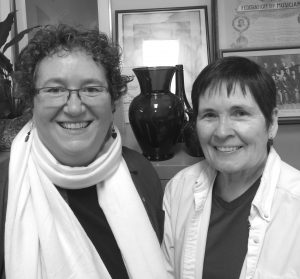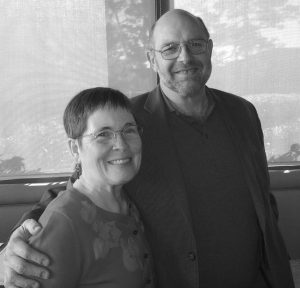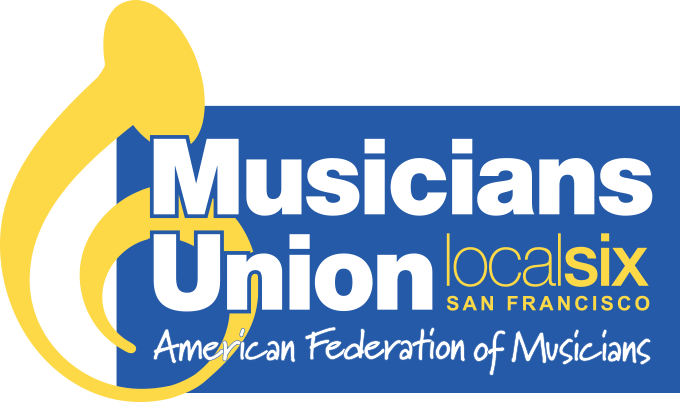An Interview With Gretchen Elliott
by Beth Zare

Beth: When did you first start working for the union?
Gretchen: It depends what you mean by working. Sometime in the late 1980s, when I was in the SF Ballet Orchestra, I was appointed steward. I think that was the first time I was active with the union. The players committee had already developed a good working relationship with the SFB Management but I began to realize the possibility of bringing about a positive change in working musicians’ lives.
Beth: When you were playing cello, did you ever see yourself as someone who would serve the members by working for the union?
Gretchen: No; not in my wildest dreams. Certainly not beyond my time as steward.
Beth: What lead you to work in the union office?
Gretchen: In 1994, a couple of years after I had retired from the Ballet Orchestra because of chronic shoulder problems, I went to work at Local 6 as a staff member. It was a real adventure because I had never worked for any length of time in an office, and I had never even seen a computer. Melinda Wagner, who was Secretary-Treasurer at the time, was willing to give me a chance because it was not easy to find people with office skills who were willing to brave the neighborhood for the low pay that was offered at the time.
Beth: Was this when the Local 6 office was located in the Tenderloin district on Jones Street?
Gretchen: Yes, the neighborhood had deteriorated considerably from the time the building was constructed around 1925. Staff members were encouraged to dress down and walk fast to work. It was rare for anyone to leave the building once we were safely inside. In other words, we all brought our lunches.
Beth: Well, times have changed, haven’t they?
Gretchen: I’d say the move to Ninth Street in 1998 was the most positive event for Local 6 during the almost twenty years of my employment. It was definitely Melinda’s legacy, though she achieved many other accomplishments during her tenure at the Local. First, it took ten years to find a legitimate buyer for the building on Jones Street. Then it took many months to locate a suitable building in a better location. Also, many of the older members were opposed to relocating. They believed that the Tenderloin would rejuvenate. Obviously, that was not to be the case. The move provided a terrific shot in the arm for the officers and staff. For the first time in our experience, members actually came to visit the union – many of them for the first time. Not a day has passed subsequent to our relocation that I haven’t consciously appreciated the effort that it took to accomplish it.
Beth: So besides Melinda how many other Presidents did you serve with?
Gretchen: Since becoming Secretary-Treasurer I only served with two Presidents: Melinda Wagner and David Schoenbrun. Though their styles are very different, they have both worked with great diligence on behalf of our membership. However, when I started working on staff, Nick Bardes was President. In 1996, he retired mid-term because of his wife’s ill health, and the difficulties presented by his long commute from Santa Rosa. Melinda was appointed by the Board to complete his term, and I was appointed to complete hers.
Beth: Now the Board has appointed me to complete your term upon your retirement. Do you have any words of advice for me?
Gretchen: Yes. Eat a good breakfast, because you may not have time for lunch! On a more serious note, the job consists of keeping track of so many details, and it can be quite a juggling act. So it’s a good idea to keep an up-to-date check list. Also, make use of your staff. Taken together, they have quite an array of skills. And of course, the biggest responsibility: take care of the union’s money!
Beth: Did you grow up with a strong labor background in your family?
Gretchen: Not that I can remember. I grew up in Phoenix, where my mother taught public school music for more than twenty-five years and played cello in the Phoenix Symphony when it was still a community orchestra. She had a myriad of other jobs as a professional musician. She was an excellent pianist and accompanist. I don’t recall ever hearing anything about the presence of a union for musicians. Maybe it is just my faulty memory or more likely it wasn’t a requirement for her to belong. Of course, now Arizona is a right to work (for less) state. She may have belonged to a school teachers union. But I doubt it, because the only thing I remember is her stating that she didn’t think school teachers should be allowed to strike.
Beth: So when did you first join the AFM?
Gretchen: I didn’t really become aware of the musicians union until I was in school at Indiana University. I first joined in Indianapolis (Local 3,) when I was seventeen, because I was offered work for a touring ballet company appearing on the IU Auditorium series. I benefitted from numerous additional work opportunities, including several weekend run-outs with Henry Mancini, as well as a two-week tour which paired Mancini and Andy Williams. An Indianapolis contractor always hired string players from the music school for engagements such as these, so I thought being a union member was a pretty good deal. When I left Bloomington, I joined Local 8 while with the Milwaukee Symphony, Local 65-699 while with the Houston Symphony, eventually joining Local 6 in 1970.
Beth: How has the union changed in the years you have been here?
Gretchen: For one thing, its membership has dropped significantly, mainly due to the continuing unfriendly-to-labor environment that has even worsened over the years. I think we are all aware of one of the consequences – the aging of our membership. Since I joined Local 6, we have lost many hundreds of members. Obviously, this is a situation that exists throughout the AFM. So far, efforts to counter this trend have been largely unsuccessful. Let’s face it, the younger generation is not pounding down the union’s door.
Beth: What will you miss most once you retire?
Gretchen: It’s hard to say. Of course, I will miss assisting and interacting with our members. For sure, I will miss working with David, our dedicated Board of Directors, and our excellent, hard-working staff. I will also miss seeing quite a few really terrific AFM local officers that I have been privileged to get to know over the years at the various union conventions and conferences. One thing I certainly won’t miss is the 10 o’clock start time. That could be really brutal!
Beth: Speaking of Conventions, how many have you attended?
Gretchen: My first was in 1997. Altogether, I attended seven of the eight conventions held during my time in office. I missed one because of a dental emergency. I’m sure you would agree that the most spectacular moment was the huge spontaneous outpouring of support, financial and otherwise, expressed by the delegates, and AFM officers and staff, for both the Twin Cities Local 30-73 and the Minnesota Orchestra musicians that took place at last summer’s convention.
Beth: What do you hope to leave behind as your legacy?
Gretchen: I hope to leave a functional membership database and accounting program! Fortunately, we seem to have worked out most of the bugs in our new Access-based program, which has been in use for just over a year now. The last wrinkle will be to iron out the addition of the merged Local 153 members. It has taken much more time – and money – than I had expected, but I have heard similar accounts from other local officers who have traveled this road. In any case, it was an absolute necessity to move away from our old DOS-based system because we were running out of hardware, and its technical capacity was limited by today’s standards. However, it did serve the local very reliably, and for a very reasonable cost, for about 25 years. I would like to mention that the transition to the new system was greatly facilitated by the tireless efforts of our recently-retired Assistant Treasurer, John Hunt.

Beth: What was your proudest moment working for Local 6?
Gretchen: I don’t know whether I would use the word proud, but I was glad to be able to help some of our members obtain health insurance by coordinating Local 6’s participation in the group health plan offered by Mark Cormany. It was only unfortunate that the cost of the premiums escalated so rapidly after the program was initiated in 2008 that some members were forced to drop out. Even so, I heard from quite a number of musicians with “pre-existing conditions” that they simply wouldn’t have been able to get meaningful coverage elsewhere – and some of them had significant health issues that needed attention. Now, with Covered California, quite a few members have found plans for much less money, and I’m very happy for them.
Beth: Lastly, what is the something you want people to know about the union that you think they may not be aware of?
Gretchen: I think many people, including some of our members, may not be aware of the dedication of union officers all over that have helped their locals and members in the face of an often hostile labor environment. Many of these officers earn little to no money for their efforts. Luckily, with the high cost of living in the Bay Area, our dedicated staff and officers at Local 6 are paid. Still, no one employed at Local 6 is getting rich!
Beth: Well Gretchen, on behalf of the entire membership let me thank you for your many years of service and may you enjoy retirement and sleeping in.
